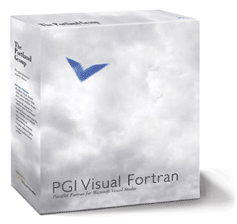PGI compilers can generate a single PGI Unified Binary™ executable fully optimized for both Intel EM64T and AMD64 processors, delivering all the benefits of a single x64 platform while enabling you to leverage the latest innovations from both Intel and AMD. The following example illustrates the benefits of the PGI Unified Binary using the Parallel Ocean Program (POP).
PGI Workstation
Multi-core parallel Fortran, C and C++ compilers and tools for 64-bit x64 and 32-bit x86 processor-based workstations
Outstanding performance, uncommon reliability, support for most common extensions, and automatic or user-directed parallelization for shared-memory parallel systems add up to compilers that "just work" for users migrating from RISC/UNIX workstations and servers to 64-bit x64 and 32-bit x86 processor-based systems running Linux, Mac OS X or Windows
PGI Server
Multi-core parallel Fortran, C and C++ compilers and tools for 64-bit x64 and 32-bit x86 processor-based Linux and Windows servers
Outstanding performance, uncommon reliability, support for most common extensions, and automatic or user-directed parallelization for shared-memory parallel systems add up to compilers that "just work" for users migrating from RISC/UNIX workstations and servers to 64-bit x64 and 32-bit x86 processor-based systems running Linux, Mac OS X or Windows.
PGI CDK Cluster Development Kit
Parallel Fortran, C and C++ Compilers & Tools for Programming HPC Clusters
In combination with the Linux or Windows HPC Server 2008 operating systems, the PGI CDK® Cluster Development Kit® compilers and development tools enable use of networked clusters of AMD or Intel x64 processor-based workstations and servers to tackle the largest scientific computing applications. For Linux, the PGI CDK includes pre-configured versions of MPI for Ethernet or InfiniBand, and a pre-configured batch queueing system. On Windows HPC Server 2008, the PGI CDK integrates with MSMPI and the job scheduler to enable development, debugging and tuning of high-performance MPI or hybrid MPI/OpenMP applications written in Fortran, C or C++.
Parallel Fortran, C and C++ Compilers
PGI compilers offer world-class performance and features including auto-parallelization for multicore, OpenMP directive-based parallelization, and support for the PGI Unified Binary™ technology. The PGI Unified Binary streamlines cross-platform support by combining into a single executable file code optimized for multiple x64 processors. This gives you the assurance that your applications will run correctly and with optimal performance regardless of the type of x64 processor on which they are deployed. PGI's state-of-the-art compiler optimization technologies include SSE vectorization, auto-parallelization, inter-procedural analysis and optimization, memory hierarchy optimizations, function inlining (including library functions), profile feedback optimization, CPU-specific micro-architecture optimizations and more. PGI is the ideal solution for migrating compute-intensive legacy applications from RISC/UNIX servers and workstations to 64-bit Linux or Windows clusters.
PGI Visual Fortran
Parallel Fortran Compilers and Tools for Microsoft Windows
PGI Visual Fortran® (PVF®) brings the PGI suite of high-performance 64-bit and 32-bit parallel Fortran compilers to Microsoft* Windows* developers using Microsoft Visual Studio*.
High-performance PGI Compilers
PVF features the latest version of PGI's native OpenMP and auto-parallel Fortran compilers. PGI compilers are supported on and can generate fully optimized code for a broad range of popular high-performance computing platforms including 64-bit x64 and 32-bit x86 processor-based systems.
PGI Fortran compilers offer world-class performance and features including both automatic and OpenMP 3.0 parallelization support for optimizing performance on multi-core processors. State-of-the-art compiler technologies found in PVF include vectorization, parallelization, interprocedural analysis, memory hierarchy optimization, cross file function inlining, CPU-specific optimization and more. PGI Unified Binary™ technology streamlines cross-platform support by combining into a single executable file code optimized for any number of different x64 processors.
PVF augments the Visual Studio debugger by adding a Fortran language specific custom debug engine. The PVF debug engine supports debugging of single and multi-thread, OpenMP, multi-thread MSMPI and hybrid MSMPI+OpenMP Fortran applications. It enables debugging of 64-bit or 32-bit applications using source code or assembly code, and provides full access to the registers and hardware state of the processors. Other multi-process MSMPI capabilities include Visual Studio property pages for configuring compile-time options, launching applications either locally on a workstation or on a distributed-memory Windows HPC Server 2008 cluster system, and debugging of programs running either locally or on a cluster.
Visual Studio Integration
PVF includes features to enable rapid code development. PVF adds syntax coloring, Fortran intrinsics tips and keyword completion to the Visual Studio editor. PVF includes a complete Fortran build environment for Visual Studio with Fortran specific features such as automatic build dependency management. PVF is interoperable with Microsoft Visual C++ so Fortran sub-programs can call C functions and vice versa. PVF includes a number of DVF/CVF compatibility features including full support for the Win32 API. Sample projects include building Fortran dialog boxes, console and Windows applications, DLLs and static libraries.
PVF augments the Visual Studio debugger with a custom debug engine that provides Fortran language specific debugging capability. The PVF debug engine supports debugging of single-thread, multi-thread, and OpenMP applications. It enables debugging of 64-bit or 32-bit applications using source code or assembly code, and it provides full access to the registers and hardware state of the processor. The PVF debug engine can debug executable files built for native Windows, Windows Subsystem for UNIX-based Applications (SUA) and Windows Services for UNIX (SFU). The PVF debug engine is interoperable with the Visual C++.



